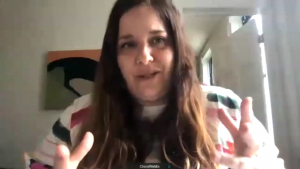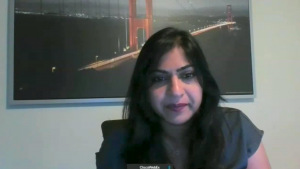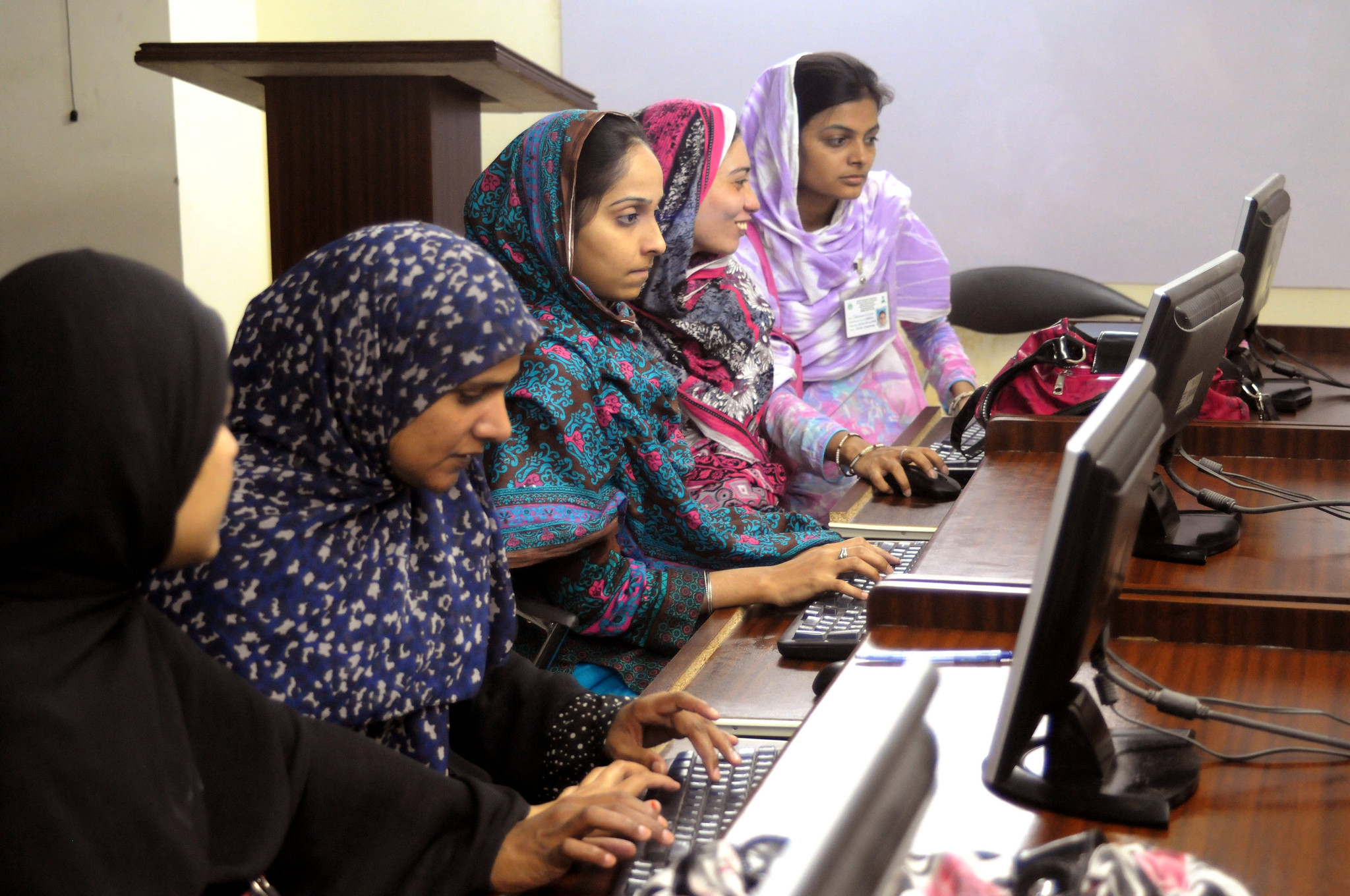The third edition of the webinar series WE Talks, organized by We-Fi in collaboration with the Aspen Network of Development Entrepreneurs (ANDE), invited participants to explore the non-financial support women-led businesses need the most during the COVID-19 (coronavirus) pandemic.
Not surprisingly, during recent months experts have noted an increased need by women entrepreneurs for practical support to help pivot their business models. They need new types of knowledge related to supply disruption, remote work, massive change in cash flow, as well as digital marketing, e-commerce, digital payment systems and web-based logistics.
Remote learning methods have become the default operating model as physical incubation centers, accelerators and network meetings are currently not accessible. Mentors, at distance but digitally connected, emerge as a key pillar for capacity-building.
In case you missed this WE Talks, please see the key takeaways below. You can also watch the full recorded session here:
The session was moderated by Wendy Teleki, Head of the We-Fi Secretariat and Randall Kemper, Executive Director of ANDE, a global network of entrepreneurship-supporting organizations in over 150 countries. ANDE’s 280 member organizations provide financial, educational, and business support services to small and growing businesses around the world.
 Kempner shared that according to a recent global study, 42 percent of small and growing businesses are at risk of failing in the next six months if they don’t receive flexible financing and technical assistance for COVID-19 related challenges. “If you apply the gender lens, you see that 46% of WSMEs are already temporarily shutting down compared to 39% for men-led SMEs. They need to access government and foundations support to survive beyond a period of 4-6 weeks in cash reserves. They also need training and capacity-building, according to the survey. And longer-term, they need help to pivot their business model to a more digital model or new ways to serve their clients”, said Kempner, adding that intermediary organizations serving SMEs are also downsizing due to a decrease in revenue.
Kempner shared that according to a recent global study, 42 percent of small and growing businesses are at risk of failing in the next six months if they don’t receive flexible financing and technical assistance for COVID-19 related challenges. “If you apply the gender lens, you see that 46% of WSMEs are already temporarily shutting down compared to 39% for men-led SMEs. They need to access government and foundations support to survive beyond a period of 4-6 weeks in cash reserves. They also need training and capacity-building, according to the survey. And longer-term, they need help to pivot their business model to a more digital model or new ways to serve their clients”, said Kempner, adding that intermediary organizations serving SMEs are also downsizing due to a decrease in revenue.
Subsequently, two women leaders from organizations within ANDE’s network presented solutions to help WSMEs manage current challenges.
Rebecca Fries , Managing Director of Value for Women Ltd , a specialized advisory firm helping organizations advance gender inclusion, started by saying that COVID-19 put SMEs in a tailspin. By working with women-led businesses, three important developments emerge, according to Fries. “Women are more likely to put plans in place to deal with COVID-19 circumstances and they are more likely than men to ask for help. Secondly, women have been seeking virtual training and support and also virtual peer-to-peer networks and communities. And thirdly, the upskilling on digital aspects of business operations is becoming more and more important, for online sales marketing, in addition to traditional business skills training”, said Fries. She cited recent research by the Cherie Blair Foundation among its 580 participating women entrepreneurs and they overwhelmingly noted an increased need for digital marketing training.
, Managing Director of Value for Women Ltd , a specialized advisory firm helping organizations advance gender inclusion, started by saying that COVID-19 put SMEs in a tailspin. By working with women-led businesses, three important developments emerge, according to Fries. “Women are more likely to put plans in place to deal with COVID-19 circumstances and they are more likely than men to ask for help. Secondly, women have been seeking virtual training and support and also virtual peer-to-peer networks and communities. And thirdly, the upskilling on digital aspects of business operations is becoming more and more important, for online sales marketing, in addition to traditional business skills training”, said Fries. She cited recent research by the Cherie Blair Foundation among its 580 participating women entrepreneurs and they overwhelmingly noted an increased need for digital marketing training.
Value for Women adapts to the current situation by providing micro- training online opportunities, in contrast to the in-person training which was the norm before the pandemic.
“The very specific needs of WSME are rooted in their sector or geography. Being able to equip mentors to disseminate such local information, ideas and creative ways to address WSMEs is the best way we found to support them”, said Fries. The speaker remarked that the flexibility to handle content in their own time, being online or offline, is especially important now with work and personal lives of women being so entangled. In addition to its capacity-building work, Fries noted that her organization is supporting partners and investors to drive more investments to women-led businesses in response to COVID-19.
Mentoring more requested by women entrepreneurs
 Presenter Anita Ramachandran, Executive Director of MicroMentor, the world’s largest community of entrepreneurs and volunteer business mentors, zoomed in on the power of mentoring and online communities including mentors. Founded over a decade ago, MicroMentor is a virtual platform serving 86,000 entrepreneurs in 179 countries, 44% of whom are women.
Presenter Anita Ramachandran, Executive Director of MicroMentor, the world’s largest community of entrepreneurs and volunteer business mentors, zoomed in on the power of mentoring and online communities including mentors. Founded over a decade ago, MicroMentor is a virtual platform serving 86,000 entrepreneurs in 179 countries, 44% of whom are women.
“When COVID-19 hit, MicroMentor was already prepared to respond”, said Ramachandran, indicating that online service delivery is at the core of the organization’s work. MicroMentor has pledged to serve 100,000 entrepreneurs affected by the pandemic and to recruit 30,000 new mentors to respond to the need for mentoring and remote one-on-one support to help pivot or restructure business models. It also created a mentor taskforce, asking current and prospective mentors to sign a pledge and go the extra mile in helping entrepreneurs during the COVID-19 crisis.
Some of the trends MicroMentor’s CEO observed are that women are connecting at a higher rate (5% point higher) to the organization’s mentoring system than the global average. Mentorship is most requested in the economic sectors of fashion/clothing, beauty/hair/cosmetics, food, education/training, and artisan/craftwork.
Ramachandran cited the example of Iris, an entrepreneur and beekeeper in the Bahamas, whose mentor has helped her to build resilience through previous hurricanes and subsequent crises and now again through the pandemic.
The presenter explained that MicroMentor works as a matching platform between entrepreneurs and mentors which allows for a tailor-made follow-up. “Standardizing mentoring does not scale”, according to Ramachandran. She noted that their research found that female entrepreneurs respond better to video content (preferably by a female presenter) than male counterparts.
“COVID-19 is forcing most entrepreneurs to search for capital and we equip our mentors with that information, where to find capital”, said Ramachandran. “Also just by having access to someone to speak to during the crisis, someone to act as a sounding board, and not immediate community member or family is helpful”, she concluded.
Five times more training than usual
Anna Wilson, Principal of the SME Finance & Development Group at the European Bank for Reconstruction and Development shared how well-performing programs and methods, including in 23 countries through its Women in Business Program, had to be adapted to a digital format in the first three months of the pandemic. Some key learnings emerged from that process.
“The first lesson is about this organic, large jump forward in digital acceptance”, said Wilson. “Before COVID-19 there was a lack of trust in digital solutions, mainly in training where the mentee would not be comfortable in sharing their challenges with someone they are not meeting face-to-face”. The EBRD representative emphasized the strong increase in demand from WSMEs, as women are more proactive and eager to access to training and support, asking what they should be doing right now in their business. “We did five times more training in the last three months than we regularly do.”
One of the challenges to the digital delivery format is that accessibility is not the same to everyone, varying geographically, Wilson added. Another complication is that currently women may need to share their devices with other members of the family. A key to success is to give multiple timing options to participate in online capacity-building, allowing the participation of more women.
Localization is also critical. EBRD requested its service providers to localize core content (e-commerce platforms, social media techniques, messaging and platforms) as much as possible, depending on the country.
Resources from ANDE:
- ANDE’s Advancing Women’s Empowerment Fund in partnership with the U.S. Agency for International Development (USAID) and the Visa Foundation
- Country specific briefs about how to support women entrepreneurs: India | Brazil
- ANDE’s Global Accelerator Learning Initiative (GALI) report on how to best accelerate women-led startups
Resources from EBRD:
- EBRD Women in Business stories
- EBRD Women in Business latest video
- EBRD’s Women of the Steppe program in Central Asia supported by We-Fi
Wilson concluded that digital engagement will probably remain high after the crisis, and it will be important to segment even more the small from mid-size enterprises, adding more targeted capacity-building.
The well-attended webinar wrapped up with a lively Q&A session about the specifics of how to select and prepare mentors and how to measure their effectiveness.
We-Fi will continue its webinar series mid-June with a WETalks session about Research & Data on the Economic Impact of Coronavirus on WSMEs.

